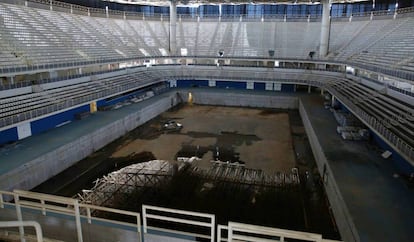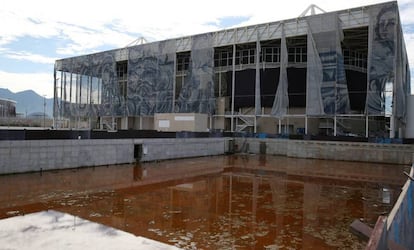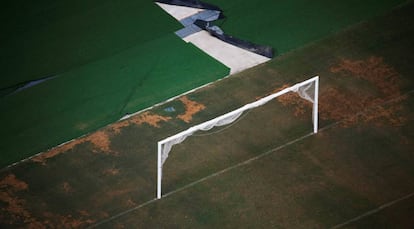From Olympic pool to mosquito swamp: the Rio 2016 debacle
Five months after Brazil Games, infrastructure has been abandoned and authorities appear paralyzed
The Olympic pool in Rio, where Michael Phelps, the most decorated athlete in Olympic history, hung up his flippers last summer, is now a breeding ground for mosquitoes. The image has been projected around the world and turned into the symbol of Rio’s Olympic legacy.

Five months after the torch was snuffed out, there is no trace of the glamour and sense of opportunity brought by sport’s most high-profile event. Whether hosting the Olympics did anything for this city suffering from decadence and economic crisis to justify the massive investment is debatable.
“I walked past here the other day and felt like crying,” says Renata Fernandes, who carried a cardboard cutout of the US gymnast Simone Biles under her arm last August and asked for time off work so that she could give the Games her full attention. “The Olympic arena where the artistic gymnastics took place is surrounded by rubble.”
London had a post-Oympics plan, Brazil does not Pedro Trengrouse, sports management expert
Like others, Fernandes is baffled by the fact that the Olympic Park is not being put to good use. “They could host the Carnival processions here,” she says. “It's an enormous space. It would relieve the traffic problems in the city.”
The boulevards connecting the major facilities in the Olympic Park have been open to the public for almost a month but few have bothered to come. City Hall has not kept a log of visitors, but when you consider there is not one fountain or kiosk to provide respite from the 40°C temperatures, it is easy to see why they might have stayed away. Couple that with the fact the heat exacerbates the stench coming from the sewage system which discharges waste into the lake and the mystery is well and truly solved.
Since last August, the Olympic Park has been used for one beach volleyball championship and nothing else. There is no fixed program for sports events and the only other kind of event penciled in is the Rock in Rio music festival in September.
Covering more than one million square meters, the premises are the joint responsibility of a number of entities, including the federal government and private constructors. Forty-seven-year-old Eduardo Paes, the former mayor from the Brazilian Democratic Movement party, who brought the games to Rio, tried on several occasions to hand the management of the Park over to the private sector but there were no takers – hardly surprising when you realize maintenance alone costs €9.2 million a year. Consequently, the Ministry of Sport stepped in last December, though it has not yet been forthcoming with the details of its plans for the city’s ‘white elephant’.

The City Council is responsible for dismantling the Aquatic Park, with original plans involving moving the two Olympic swimming pools to different parts of the city. In the end, however, they have been earmarked for high-level army training and competition.
The Arena 3 pavilion, where the judo and taekwondo Olympic events took place, is to be transformed into an Olympic gymnasium for almost 1,000 aspiring gymnasts, though the inauguration date is yet to be revealed.
And the Future Arena, the venue that hosted handball and volleyball, is still to go out to tender so it can be dismantled and converted into four state schools. “Nothing is being abandoned,” protest voices in Rio’s department for sports.
London had a plan
The local and international media have criticized the paralysis in Rio while the former mayor is asking for some respite. “The contracts and agreements have been signed, but you can't disassemble buildings which took years to put up in a few months,” he argues.
After hosting the Games in 2012, London also took its time in putting its Olympic facilities to use: 19 months to be precise. But this parallel does not seem to be appeasing Rio’s critics. “London had a plan, Brazil does not,” says Pedro Trengrouse, Professor of Sports Management at the Getúlio Vargas Foundation. “The chief legacy of the Olympic Games in London was the urban development of neglected areas of the city. It’s very different from what happened in Rio, where investment was poured in to one of its wealthiest neighborhoods, Barra de Tijuca.
I walked past here the other day and felt like crying Renata Fernandes, sports fan
Less than 20 km from the Olympic Park, the Deodoro Radical Park is still closed. This is the second biggest Olympic facility and an oasis of green in a rundown neighborhood of Rio almost an hour’s drive from the famous Ipanema beach. A venue for canoeists and BMX competitors, it opened its doors to local residents before the Games when the former mayor realized that many were jumping the fences to make use of the free pool, but it has been closed since December. The management contract expired and the new mayor, Marcelo Crivella, a 59-year-old evangelist, whose catchphrase is “restrict spending”, is still looking at how it might be reopened. The City Council had promised it would happen in February but the security guard at the gate points out that nothing happens in the city until after Carnival.
“There was no provision made for adapting the infrastructure,” says district attorney Leandro Mitidieri, who spent the months in the run-up to the games asking the authorities for a morning-after plan, which he got the day the Games were inaugurated, thanks to a court order. “They did not keep their promise to clean up 80% of Guanabara Bay [where the sailing races took place],” he says.
The Temple of Brazilian football, Maracanã, where the Brazilian team beat Germany on penalties to win gold, represents the worst aspect of the Olympic hangover, with its dry grass and ripped out seating. Its maintenance is in limbo due to an unresolved conflict between the stadium’s management and the Rio 2016 Committee. Meanwhile, the Rio state government, which doesn't even have the resources to pay its staff, is hoping the problem will be solved with a new tender.

“The government and the International Olympic Committee (IOC) promised a lot but didn’t deliver much, “ says Professor Trengrouse. “Brazil should have had it's own agenda in the Games and not limited itself to complying with the requirements of the IOC. For example, the Fluminense and Flamengo clubs where most of the Olympic athletes trained should have received investment to upgrade their facilities so they could be used as a venue for competitions. How can you explain the fact that after hosting the Pan American Games, the Confederations Cup, the World Cup, the Olympic Games and the Paralympics, Rio does not even have a football stadium?”
English version by Heather Galloway.
Tu suscripción se está usando en otro dispositivo
¿Quieres añadir otro usuario a tu suscripción?
Si continúas leyendo en este dispositivo, no se podrá leer en el otro.
FlechaTu suscripción se está usando en otro dispositivo y solo puedes acceder a EL PAÍS desde un dispositivo a la vez.
Si quieres compartir tu cuenta, cambia tu suscripción a la modalidad Premium, así podrás añadir otro usuario. Cada uno accederá con su propia cuenta de email, lo que os permitirá personalizar vuestra experiencia en EL PAÍS.
¿Tienes una suscripción de empresa? Accede aquí para contratar más cuentas.
En el caso de no saber quién está usando tu cuenta, te recomendamos cambiar tu contraseña aquí.
Si decides continuar compartiendo tu cuenta, este mensaje se mostrará en tu dispositivo y en el de la otra persona que está usando tu cuenta de forma indefinida, afectando a tu experiencia de lectura. Puedes consultar aquí los términos y condiciones de la suscripción digital.









































